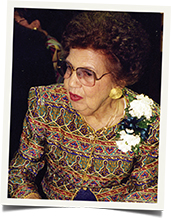




Jeanne Murray Walker, professor of English at the University of Delaware, is a poet and playwright. She has written seven volumes of poetry and gives readings, runs workshops and speaks across the United States and abroad. Her poems appear in print anthologies, as well as on the radio, the web, and in busses and trains under the auspices of the Poetry in Motion project. Her newest book, A Geography of Memory, has been called "the hopeful story about Alzheimer's that readers are waiting to hear."

Erna Aderhold Murray Kelly, Walker's mother, is pictured above.
Jeanne Murray Walker smiles as she recalls how her mother, who suffered from dementia, foiled every doctor she visited.
"She was never technically diagnosed with Alzheimer's," says Walker, professor and head of creative writing in the Department of English. "The doctors would give her the Alzheimer's test, but she always found some clever way to subvert it."
Walker's memoir, The Geography of Memory: A Pilgrimage Through Alzheimer's, is a deeply personal account of her mother' battle with the bleak disease. Walker describes the difficulties, as well as the significant gifts, that came along with taking care of her mother.
"The conversation about Alzheimer's in this country is ruled by hysteria," Walker says. "No wonder people are sometimes so terrified of the disease that they abandon their aged parents. This memoir offers a less catastrophic view than most books about Alzheimer's."
Walker weaves together three different strands in the memoir. One strand focuses on the day-to-day challenges she faced as a caregiver. A second strand narrates pieces of her own history as an adolescent—memories triggered by spending time with her mother. The third strand is a series of reflections on the topic of memory.
"Caregivers encounter many problems, including problems with time, problems with money, problems with geography. There is no textbook to solve these problems," says Walker.
On top of practical problems, Walker confronted the disturbing "role reversal" that happens when a child must take care of a parent.
For instance, Walker worried about her mother's finances, while her mother, a notoriously private woman, fought to keep her personal information from her daughters.
The memoir recounts Walker's growing realization that the bond forged by caring for her mother was leading to new insights into both herself and her mother.
"My mother frequently said things that appeared not to make any sense in the situation, but I came to realize they were sometimes perceptive and revealing metaphors about her past," she explains.
In addition to exploring the dynamic relationship with her mother, Walker reflects on how her relationship with her sister also changed as a result of the family's confrontation with Alzheimer's.
After spending years separated by geography, Walker found that her increasingly frequent trips from Philadelphia to Dallas to visit her mother and sister brought their worlds closer together.
This new connection did not always go smoothly. Years earlier, when Walker had moved to the East Coast and her sister followed their mother to Dallas, a divide formed between the sisters. They lived completely different lives in culturally different areas.
"After you live for years in different regions of the country, you don't know each other as well as you did as children," she notes.
Faced with the unpredictable task of taking care of their mother, Walker realized that although she and her sister had chosen different paths, they now walked together on the same journey.
More than 20 million adult children in America take care of a parent with Alzheimer's. Many of them share the task with a sibling. Geography of Memory tells the story of how siblings might struggle with one another over the task, but can ultimately reach peace and a new relationship.
"Taking care of my mother, I got to know my sister again," says Walker. "It was a surprise and a gift."
Ironically, at the time of Walker's mother's death, the family was once again separated by geography. The memoir begins in a Paris hotel room, where Walker must decide either to fly back to Dallas for her mother's burial or stay and continue teaching a study abroad class in London.
While writing this researched reflection on the subject of memory, Walker received a sabbatical and a travel grant from the dean of the College of Arts and Sciences at UD. She flew back to Dallas to doublecheck the accuracy of her own memories.
"I am not only grateful for the financial support," she says, "But to be given such an expression of faith in the project was a real boost."
Ultimately, Walker wrote the memoir to honor her mother.
"My mother was a vibrant, funny woman, who faced remarkable challenges," says Walker, "a woman of great fortitude and also a woman of faith."
Walker found it difficult to write one of the last chapters of the memoir. She was not sure she wanted to record her mother's final, startling incoherence.
She decided to tell her mother's story just as she lived it.
"Now I can say that as my mother journeyed more deeply into the land of Alzheimer's, she was always still a person," she writes, "still herself, still my mother."